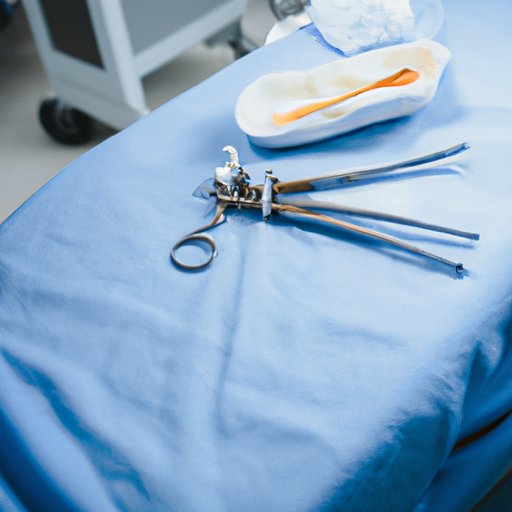Introduction
When considering different forms of contraception, a vasectomy is an option for men who want to take control over their own reproductive health. It’s a permanent form of male contraception that prevents sperm from being released during ejaculation. But how long after a vasectomy until a man is sterile? This article will explore the timeframe for when a man becomes sterile after a vasectomy, as well as examine how quickly you become sterile following the procedure.
How Long After a Vasectomy Until You Are Sterile?
It typically takes about three months after a vasectomy for a man to become sterile. During this time, it’s important to use another form of contraception since sperm can still be present in the semen. The body needs time to clear out the remaining sperm, and it usually takes about 20 ejaculations or more before all the sperm are gone.
Once a man has gone through the required number of ejaculations, he will need to have a semen analysis test done to confirm sterility. This test involves collecting a sample of semen and sending it to a laboratory for testing. If there are no sperm present in the sample, then the man is considered to be sterile.
According to the American Urological Association (AUA), the success rate for vasectomies is greater than 99%, meaning that most men who undergo the procedure will become sterile within three months. However, it’s important to note that there are some factors that can affect the timeline for becoming sterile, which will be discussed later on in this article.
Understanding the Process of Becoming Sterile After a Vasectomy
Before exploring the timeline of becoming sterile after a vasectomy, it’s important to understand what the procedure entails and its effects. A vasectomy is a minor surgical procedure in which the tubes that carry sperm from the testicles to the penis are cut and sealed off. This prevents sperm from mixing with the semen and being released during ejaculation.
The procedure itself only takes about 15-30 minutes to complete and is usually done under local anesthesia. Recovery time is usually short, and most men can return to their regular activities within a few days. It’s important to follow the doctor’s instructions for post-operative care, such as taking it easy for a few days, avoiding strenuous activity, and wearing supportive underwear.
In addition, it’s important to remember that a vasectomy does not provide immediate protection against pregnancy. Even after the procedure, sperm can still remain in the semen for up to three months. That’s why it’s important to use another form of contraception until a semen analysis confirms that the man is sterile.
Questions Answered: How Long After a Vasectomy Until You Are Sterile?
Now that we’ve explored the process of a vasectomy and its effects, let’s look at the timeline of becoming sterile after the procedure. As mentioned earlier, it typically takes three months for a man to become sterile after a vasectomy. This timeframe is based on the average number of ejaculations it takes for all the sperm to be cleared from the system.
However, there are some factors that can affect this timeline. For example, if a man has a higher sperm count before the procedure, it could take longer for him to become sterile. In addition, some studies have found that younger men may take longer to become sterile than older men. This could be due to the fact that younger men tend to have higher sperm counts.
“Our findings suggest that younger patients may take longer to achieve azoospermia [absence of sperm in the semen], suggesting that they should be monitored closely,” said Dr. Justin Cates, lead author of a study published in the Journal of Urology.
Conclusion
A vasectomy is a permanent form of male contraception that prevents sperm from being released during ejaculation. This article explored how long after a vasectomy until a man is sterile, as well as examined the process of becoming sterile after the procedure. It typically takes about three months for a man to become sterile after a vasectomy. However, there are some factors that can affect the timeline for becoming sterile, such as age and sperm count.
If you’re considering a vasectomy, it’s important to talk to your doctor about the timeline for becoming sterile. Your doctor can also answer any other questions you may have about the procedure and its effects.
(Note: Is this article not meeting your expectations? Do you have knowledge or insights to share? Unlock new opportunities and expand your reach by joining our authors team. Click Registration to join us and share your expertise with our readers.)
